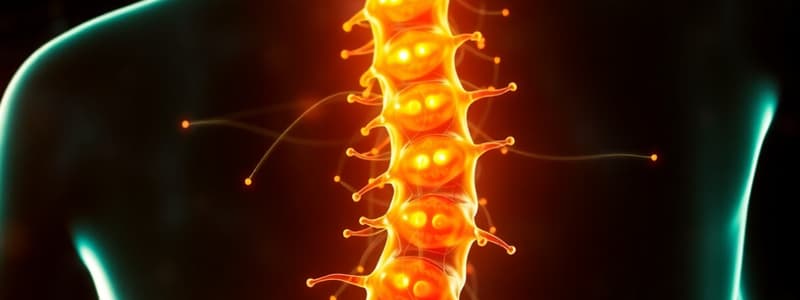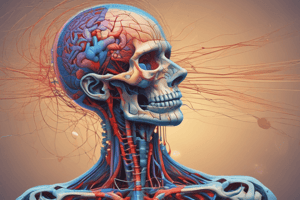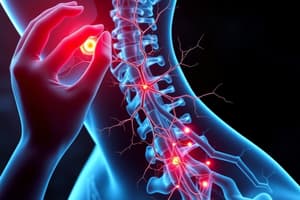Podcast
Questions and Answers
Which mechanism primarily affects pain control through modulation in the spinal cord?
Which mechanism primarily affects pain control through modulation in the spinal cord?
- Promotion of excitatory neurotransmitter pathways
- Inhibition of neurotransmitter release in the substantia gelatinosa (correct)
- Enhancement of sensory receptor sensitivity
- Activation of the dorsal horn neurons
What role do NMDA receptors play in pain management?
What role do NMDA receptors play in pain management?
- They provide analgesic effects through serotonergic pathways
- They enhance the release of endogenous opioids
- They contribute to pain memory when activated by glutamate (correct)
- They are the primary site for substance P action
Which neurotransmitter is NOT typically involved in pain transmission in the spinal cord?
Which neurotransmitter is NOT typically involved in pain transmission in the spinal cord?
- Serotonin
- Cholecystokinin
- Substance P
- Epinephrine (correct)
How does increasing the release of endogenous opioids affect pain signaling?
How does increasing the release of endogenous opioids affect pain signaling?
Which of the following pathways has an analgesic effect through norepinephrine?
Which of the following pathways has an analgesic effect through norepinephrine?
What is the primary action of mu and kappa opioid receptors in pain control?
What is the primary action of mu and kappa opioid receptors in pain control?
What effect does blocking NMDA receptors have on pain syndromes?
What effect does blocking NMDA receptors have on pain syndromes?
Which neurotransmitter is least likely to be associated with pain modulation in the spinal cord?
Which neurotransmitter is least likely to be associated with pain modulation in the spinal cord?
What is a significant risk associated with the use of COX-1 inhibitors?
What is a significant risk associated with the use of COX-1 inhibitors?
Which condition is least appropriately treated with Celecoxib?
Which condition is least appropriately treated with Celecoxib?
Which of the following statements about Diclofenac is incorrect?
Which of the following statements about Diclofenac is incorrect?
What is a major caution to consider when prescribing COX-1 inhibitors?
What is a major caution to consider when prescribing COX-1 inhibitors?
What potential side effect can occur if COX-1 inhibitors are taken with certain dosing conditions?
What potential side effect can occur if COX-1 inhibitors are taken with certain dosing conditions?
Which statement regarding Indomethacin is correct?
Which statement regarding Indomethacin is correct?
Which of the following is NOT a therapeutic application of Diclofenac?
Which of the following is NOT a therapeutic application of Diclofenac?
What is the primary mechanism by which aspirin inhibits platelet aggregation?
What is the primary mechanism by which aspirin inhibits platelet aggregation?
What is a critical instruction for patients prescribed COX-1 inhibitors?
What is a critical instruction for patients prescribed COX-1 inhibitors?
Which of the following is a risk associated with the overdose of acetaminophen?
Which of the following is a risk associated with the overdose of acetaminophen?
How does the administration of n-acetylcysteine function in cases of acetaminophen overdose?
How does the administration of n-acetylcysteine function in cases of acetaminophen overdose?
What is the maximum daily dose of acetaminophen for adults to avoid toxicity?
What is the maximum daily dose of acetaminophen for adults to avoid toxicity?
Which patient population should be monitored closely when using NSAIDs?
Which patient population should be monitored closely when using NSAIDs?
What is the reason for not using NSAIDs as first-line therapy in certain populations?
What is the reason for not using NSAIDs as first-line therapy in certain populations?
Which of the following statements about aspirin is true?
Which of the following statements about aspirin is true?
In which circumstance is acetaminophen considered safe for use?
In which circumstance is acetaminophen considered safe for use?
What is a common side effect of using Ketorolac?
What is a common side effect of using Ketorolac?
Which condition is NOT typically treated with Ketorolac?
Which condition is NOT typically treated with Ketorolac?
What is a contraindication for the use of Ketorolac?
What is a contraindication for the use of Ketorolac?
What activity is NOT associated with the mechanism of action of Ketorolac?
What activity is NOT associated with the mechanism of action of Ketorolac?
What should be closely monitored when administering Ketorolac?
What should be closely monitored when administering Ketorolac?
Which of the following conditions is an indication for the use of Ketoprofen?
Which of the following conditions is an indication for the use of Ketoprofen?
What percentage reduction is recommended for the dose of a new opioid to avoid overdose after converting from another opioid?
What percentage reduction is recommended for the dose of a new opioid to avoid overdose after converting from another opioid?
Which of the following is a major concern when prescribing Tramadol alongside SSRIs?
Which of the following is a major concern when prescribing Tramadol alongside SSRIs?
Which condition contraindicates the use of opioids mentioned in the content?
Which condition contraindicates the use of opioids mentioned in the content?
What is a key pharmacokinetic characteristic of Tramadol?
What is a key pharmacokinetic characteristic of Tramadol?
What type of agonist is Buprenorphine classified as?
What type of agonist is Buprenorphine classified as?
Which of the following interactions should healthcare providers be cautious of when prescribing Tramadol?
Which of the following interactions should healthcare providers be cautious of when prescribing Tramadol?
What is the primary limitation of Buprenorphine in the context of pain management?
What is the primary limitation of Buprenorphine in the context of pain management?
What primary mechanism does ibuprofen use to exert its analgesic effects?
What primary mechanism does ibuprofen use to exert its analgesic effects?
Which condition is most prominently treated with ibuprofen?
Which condition is most prominently treated with ibuprofen?
Which potential side effect is specifically associated with the use of ibuprofen?
Which potential side effect is specifically associated with the use of ibuprofen?
When should caution be exercised when prescribing ibuprofen?
When should caution be exercised when prescribing ibuprofen?
What is the effect of ibuprofen on platelet aggregation?
What is the effect of ibuprofen on platelet aggregation?
What is an essential function of pain assessment in pharmacotherapy?
What is an essential function of pain assessment in pharmacotherapy?
Which neurotransmitters are primarily involved in endogenous pain modulation?
Which neurotransmitters are primarily involved in endogenous pain modulation?
Which mechanism directly inhibits pain signaling by acting on the substantia gelatinosa in the spinal cord?
Which mechanism directly inhibits pain signaling by acting on the substantia gelatinosa in the spinal cord?
Which neurotransmitter's inhibition is crucial for reducing pain memory related to chronic pain syndromes?
Which neurotransmitter's inhibition is crucial for reducing pain memory related to chronic pain syndromes?
What is the effect of increasing the action of norepinephrine on pain sensation?
What is the effect of increasing the action of norepinephrine on pain sensation?
What is a significant pathway involved in pain modulation from the brain?
What is a significant pathway involved in pain modulation from the brain?
How does the release of prostaglandins affect pain perception?
How does the release of prostaglandins affect pain perception?
Which area of the central nervous system is primarily involved in the modulation of pain through endogenous opioids?
Which area of the central nervous system is primarily involved in the modulation of pain through endogenous opioids?
In pain transmission, what is the function of the substantia gelatinosa?
In pain transmission, what is the function of the substantia gelatinosa?
What occurs when glutamate is blocked from binding to NMDA receptors?
What occurs when glutamate is blocked from binding to NMDA receptors?
What is the primary purpose of the afferent pathway in pain transmission?
What is the primary purpose of the afferent pathway in pain transmission?
Which approach can enhance the analgesic effects observed in pain management?
Which approach can enhance the analgesic effects observed in pain management?
What is a significant consideration in the duration of Ketorolac use?
What is a significant consideration in the duration of Ketorolac use?
What should be monitored in patients receiving Ketorolac?
What should be monitored in patients receiving Ketorolac?
What condition is NOT typically treated with Ketorolac?
What condition is NOT typically treated with Ketorolac?
What is the consequence of combining Ketorolac with anticoagulants?
What is the consequence of combining Ketorolac with anticoagulants?
What is a potential consequence of using Ketorolac in patients with changing renal function?
What is a potential consequence of using Ketorolac in patients with changing renal function?
What is the main pharmacological action of Butorphanol?
What is the main pharmacological action of Butorphanol?
In which situation is Nalbuphine most likely contra-indicated?
In which situation is Nalbuphine most likely contra-indicated?
What is a key therapeutic application of Buprenorphine combined with Naloxone?
What is a key therapeutic application of Buprenorphine combined with Naloxone?
What is the primary use of Butorphanol?
What is the primary use of Butorphanol?
Which mechanism describes Nalbuphine's action on Mu and Kappa receptors?
Which mechanism describes Nalbuphine's action on Mu and Kappa receptors?
What is a common side effect associated with the use of Butorphanol?
What is a common side effect associated with the use of Butorphanol?
What is a potential drawback of using Buprenorphine in pain management?
What is a potential drawback of using Buprenorphine in pain management?
For what purpose is Nalbuphine sometimes used in patients receiving more histaminergic opioids?
For what purpose is Nalbuphine sometimes used in patients receiving more histaminergic opioids?
What type of patient should be closely monitored when using Butorphanol?
What type of patient should be closely monitored when using Butorphanol?
Which medication is classified as a c-IV controlled substance?
Which medication is classified as a c-IV controlled substance?
Flashcards are hidden until you start studying
Study Notes
Pain Modulation in the Spinal Cord
- The substantia gelatinosa in the spinal cord plays a critical role in pain transmission.
- Pain can be controlled by inhibiting neurotransmitter release in this region.
Neurotransmitters Involved in Pain Transmission
- Substance P, GABA, cholecystokinin, somatostatin, calcitonin gene-related peptide, and glutamate are neurotransmitters involved in pain signaling.
- Inhibiting the release of these neurotransmitters, particularly excitatory ones like glutamate, can reduce pain perception.
NMDA Receptors and Pain Memory
- Glutamate binding to NMDA receptors in the spinal cord contributes to the development of pain memory.
- Inhibiting glutamate release or blocking NMDA receptors could potentially reduce chronic pain syndromes.
Efferent Pathway Modulation of Pain
- Efferent pathways from the brain play a role in pain modulation.
- These pathways release endogenous opioids in the periaqueductal gray (PAG) and dorsal horns of the spinal cord.
- Enhancing the release of endogenous opioids or mimicking their effects can inhibit pain-transmitting neurotransmitters in the spinal cord.
Serotonin and Norepinephrine in Pain Control
- Neurons from the rostral pons to the raphe magnus release norepinephrine, which has an analgesic effect.
- Serotonin release from the PAG sends analgesic signals to the raphe magnus.
- Enhancing the release or activity of these neurotransmitters can help inhibit pain transmission in the spinal cord.
Opioid Receptors and Pain Inhibition
- Opioid receptors (mu, kappa, and delta) are present in the brain, spinal cord, and peripheral tissues.
- Activating these receptors, particularly the mu and kappa receptors, can lead to the inhibition of pain-transmitting neurotransmitters in the spinal cord.
Pain Assessment
- Pain assessment is essential for selecting the most effective treatment, considering the type and intensity of pain.
- It allows for tailored pharmacotherapy, improving effectiveness and minimizing adverse effects.
- Pain assessment also helps monitor patient response to treatment, leading to adjustments when necessary.
Neural Mechanisms in Pain
- Pain transmission relies on a three-way pathway:
Afferent Pathway
- Nociceptive receptors in tissues sense injury and release arachidonic acid.
- COX enzymes convert arachidonic acid into prostaglandins.
- Afferent nerve fibers transmit pain signals to the dorsal horn of the spinal cord.
Central Nervous System (CNS)
- Pain signals enter the posterior nerve root of the spinal cord.
- They travel through the lateral spinothalamic tract, where they can be modulated within the substantia gelatinosa.
- Neurotransmitters bind to secondary neurons in the substantia gelatinosa to relay pain signals to the brain.
- Important Note: NMDA receptors play a crucial role in pain memory and sensitization, particularly in chronic pain.
### Efferent Pathway
- Efferent pathways from the brain modulate pain sensation, releasing endogenous opioids (endorphins, enkephalins, and dynorphins) in areas like the periaqueductal gray (PAG) and dorsal horns of the spinal cord.
- Neurons projecting from the rostral pons to the raphe magnus secrete norepinephrine, which has an analgesic effect.
- Serotonin is also released from the PAG and contributes to analgesia.
Controlling Pain
- Pain control can be achieved by inhibiting the release of spinal neurotransmitters through various mechanisms:
Modulation in the Spinal Cord
- Inhibition of neurotransmitter release in the substantia gelatinosa can effectively manage pain.
Specific Neurotransmitter Release
- Inhibiting the release of specific neurotransmitters involved in pain transmission within the spinal cord, particularly excitatory ones like glutamate, can reduce pain signaling.
NMDA Receptor Involvement
- Inhibiting glutamate release or blocking NMDA receptors could potentially reduce chronic pain syndromes.
Efferent Modulation
- Efferent pathways from the brain contribute to pain modulation through the release of endogenous opioids.
- Increasing the release of these opioids or mimicking their effects can inhibit pain-transmitting neurotransmitters in the spinal cord.
Serotonin and Norepinephrine
- Enhancing the release or activity of serotonin and norepinephrine can help inhibit pain signaling in the spinal cord.
Opioid Receptors
- Activating opioid receptors, particularly the mu and kappa receptors, can lead to the inhibition of pain-transmitting neurotransmitters in the spinal cord.
Complementary and Alternative Therapies
- Inhibition of cyclooxgenase (COX-1 and COX-2) is thought to be the primary mechanism of action for certain therapies.
Ibuprofen
- An NSAID with analgesic and antipyretic properties, inhibiting prostaglandin synthesis.
- It also inhibits platelet aggregation.
- Common uses include headache, pain, fever, RA, and OA.
- Potential side effects include hypotension, hypernatremia, hypoalbumemia, dizziness, GI upset, and heartburn.
- Important Notes:
- Contraindicated in the third trimester of pregnancy.
- Probably safe at low doses during lactation.
- Use with caution in kidney disease, ulcer disease, and gastritis.
- Renal dosing is recommended.
- Risk of MOH with daily use.
Ketoprofen
- An NSAID with anti-inflammatory properties.
- Common use includes RA.
- Probenecid can amplify the effects of ketoprofen.
Ketorolac (Toradol)
- An NSAID with analgesic and antipyretic properties.
- Its exact mechanism of action is unknown, but it is thought to inhibit prostaglandin/ leukotriene synthesis, possess antibradykinin activity, and have lysosomal membrane-stabilizing effects.
- Common uses include OA, gout, mild to moderate pain, dysmenorrhea.
- Potential side effects include edema, hypertension, eye burning, nasal irritation, and nasal pain.
- Important Notes:
- Limit duration to 5 days.
- Contraindicated in pregnancy, lactation, kidney disease, ulcer disease, and gastritis.
- Do not exceed 5 consecutive days of use.
- Renal dosing is recommended.
- Risk of MOH possible with daily use.
- Exercise caution in patients with changing renal function, bleeding risk, those on anticoagulants or anti-platelet drugs, and individuals with a risk of CVD or GI bleeding.
Buprenorphine + Naloxone
- Further research is needed to understand the specific actions and effects.
Butorphanol (c-IV)
- A kappa agonist and mu partial agonist/ antagonist.
- Common uses include pain, pre-anesthesia sedation.
Nalbuphine (No class)
- A mu agonist and kappa antagonist.
- Common uses include moderate to severe pain, pre-op sedation.
- Important Note: Can be used to counteract opioid pruritus (itching) associated with more histaminergic opioids. Do not administer IV in line with IV solutions.
Studying That Suits You
Use AI to generate personalized quizzes and flashcards to suit your learning preferences.




